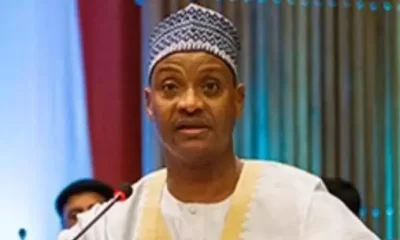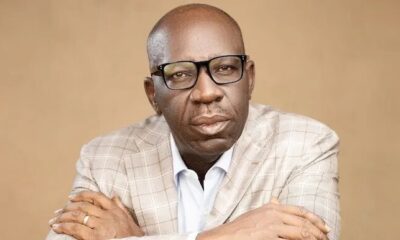Democracy & Governance
Connecting the Dots of Corruption: How Individual Greed Crippled Nigeria (III) -By Bámidélé Adémólá-Olátéjú

Everywhere you turn in Nigeria, corruption thrives. It has become the culture. No sector is spared, including the media. Corruption in the media erodes press freedom and promotes media bias. The role of a vibrant and free press as the bedrock of a functioning democracy cannot be overemphasised. In Nigeria, the press is vibrant and remains free to a large extent. Unfortunately, bribery and hush money permeates the sector. Media moguls and their poorly renumerated journalists are known to accept brown envelopes. Frequently, editors and publishers bury stories capable of embarrass their political patrons after they have been “settled”. An example that became public from the Dasuki loot was the case of Raymond Dokpesi of Daar Communications, owner and chairman of Africa Independent Television (AIT), who accepted $12.4 million in public funds from President Goodluck Jonathan for favourable re-election coverage and campaign. Many media outfit owners who are neck deep in these practices owe their workers months in unpaid salaries. How do you preach ethics to an unpaid journalist who has mouths to feed, bills to pay and obligations to meet?
Environmentally, Nigeria has been degraded. Indiscriminate

While no one accepts the blame for our lack of development or direction, who do we blame for our security failures? As small as Togo is, it has no problem. Ghana solved its herdmen menace by declaring war against open grazing. In our case, everything is politics, including with human lives and our sovereignty. The constitution of Nigeria’s security architecture is laughable. It is notoriously inept because it has no respect for merit. Its design and administration is based on politics, ethnicity and religion. According to Transparency International, the Nigerian armed forces is reputed to be one of the most corrupt defence and security sector in the world. Decades of diversion, graft, cronyism, favouritism in recruitment and promotion have destroyed them from within and rendered them ineffective to combat any conflict. Corruption in the military is the major reason why a security force once adjudged the best in Africa is unable to rout Boko Haram. An example of damage to the military can be found in how the former national security adviser, Sambo Dasuki allegedly diverted $2 billion into private hands. The investigations into former chief of defence, Air Marshal Alex Badeh – alleged to have stolen $900,000, and chief of air staff, Air Vice-Marshal Amosu – from who $150 million and N2.4 billion have been recovered, show how deep corruption runs in the defence sector. The frontline consequences of corruption in the sector continues, as recently seen in the Metele attack. Despite huge increases in defence spending, soldiers continue to die due to obsolete equipment, hunger and unpaid allowances. The most damaging defence sector corruption is government approved! It is called the “security vote.” This free money is given to certain federal, state, and local officials. Transparency International estimates it to be about $650 million per year and it is exempt from procurement rules and audit.
The police plays a vital role in any country’s security architecture.
The Nigerian police is visible, even to a first time visitor to Nigeria,
as pathetically corrupt. For the last 45 years, the policeman is the
most bribed of any public official. The police are predatory, poorly
paid, badly kitted and trained to extort. Their presence are mostly felt
at checkpoints where they extort N50 from commercial drivers openly.
The Nigerian police has a meagre 270,000 personnel in a country of
almost 200 million people! About a third of them are deployed to private
homes and businesses, while the public suffers. The police operate a
unitary command with a fork lift, fetch-and-drop strategy in which
rank-and-file officers remit part of what they extort up their chain of
command. Extortion and embezzlement have crippled the Nigerian police,
leaving it unable to address many internal security challenges facing
the country. Earlier this year, the accountant general of the federation
said there are over 80,000 ghost workers in the Nigeria Police Force.
That is more than 20 per cent of an already understaffed force. A visit
to the police station reveals a country at war with those charged with
maintaining law and order. The ambience is revolting, while officers buy
their own uniforms and stationeries and are housed in deplorable
conditions not fit for pigs.
Because we do not connect the dots, we are unable correlate the lack of punishment for actions as one of the reasons why we are where we are. Further up the judicial chain, we tend to think only the judges are corrupt. No! The lawyers, magistrates, and administrative staff are also involved. Like the police, our legal institutions are very weak and easily beaten. Judges often use their deep knowledge of the law to dismiss cases on the basis of obscure technicalities after accepting bribes. They sometimes bar critical evidence, or collude with defence lawyers to use delay tactics to stall cases for several years. We are all witnesses to cases where prime witnesses die in custody with no autopsy done and no question asked. Same for incidents of evidence tampering and cash gifts to judges, for them to scuttle cases. We do not connect the dots that without justice there can be no peace. Without justice long term investment will be a mirage because investors will be afraid of not finding succor in our courts for enforcement of contracts and protection from bad actors.
What’s a country to do when anti-corruption agencies themselves are mirred in corruption? Many officials of the
three main anti-corruption agencies – the Economic and Financial Crimes
Commission (EFCC), the Independent Corrupt Practices and Other Related
Offences Commission (ICPC), and the Code of Conduct Bureau (CCB) accept
bribes and bask in opulent lifestyles that cannot be justified by their
salaries. It is still as it was during the administration of President
Obasanjo, when he used the EFCC to go after corrupt political rivals,
while pressuring them to turn a blind eye to his corrupt loyalists.
President Muhammadu Buhari’s anti-corruption efforts are selective. When
Farida Waziri was head of the EFCC, she worked hard to sabotage EFCC’s
prosecutorial and investigative work. She worked with Attorney General
Michael Aondoakaa to frustrate efforts by the United Kingdom to recover
millions of dollars from then Governor James Ibori. At some point, under
her watch, the United States suspended assistance to the EFCC. How is
that for an anti-corruption agency?
It is bad that corruption has become endemic. What should worry every patriot is the socialisation of the young into corruption. Nigeria’s education sector has suffered under the yoke of corruption and mismanagement for decades. Corruption in education is a major problem, either in the form of stealing money meant for building and equiping schools or extorting money from students in return for admissions or improved examination grades. Corruption in the educational sector threatens the future of Nigeria’s socioeconomic development. During the last May/June West African Examination Council’s administered examination, the marking scheme was available on certain websites a day before each examination was written. Students are being aided by their parents to cut corners by using special centres where they pay to use prepared anders or where the exams are written for them. Once world class institutions like the University of Ibadan, Obafemi Awolowo University and the University of Nigeria Nsukka have been gutted. Agencies like the Joint Admissions and Matriculation Board (JAMB) and the Tertiary Education Trust Fund (TETFUND) have been dogged by scandals of embezzlement and theft. One JAMB official, claimed a snake ate the ₦36 million she stole.
Not even the threat of mass death can stop a Nigerian from stealing. In the health sector, corrupt officials have been known to embezzle, not only budgeted funds, but funds from foreign donors like the GAVI Alliance. Like every other sector, Nigeria’s public health infrastructure is inadequate and hampered further by corruption, mismanagement, and inadequate funding. Health administrators often embezzle funds, and inflate construction or equipment contracts. When these are factored into the abysmal $270 spent per capita, along with other debilitating problems within the Nigerian state, it is not difficult to imagine the health outcomes, leading to its 54-year life expectancy figure. Recently, Nigeria’s health minister sacked the head of the National Health Insurance Scheme (NHIS) after an internal investigation implicated him in the misappropriation of $2.5 million in training funds, and his preference for giving his brother’s firm juicy consulting contracts. President Buhari overruled his own minister and reinstated a man under investigation. The game plays itself out in internally displaced persons (IDPs) camps in the North-East, where officials from the National Emergency Management Agency (NEMA) and its state counterpart agencies (SEMAs) obstruct international aid efforts, and hijack relief funds and materials. Mohammed Sani Sidi, the NEMA director-general from 2010 to 2017, awarded a $128,000 contract for temporary shelters for IDPs to the son of Ali Modu Sheriff, the former Borno State governor, who was the sponsor of Boko Haram founder, Mohammed Yusuf. He also awarded consulting contracts to a U.K. company he co-owned. How is that for cronyism and conflict of interest?
This series has attempted to chronicle how we as individuals have ruined this country and how our collective actions have compromised our future.
Bámidélé



















